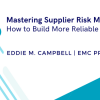The fact that the U.K.’s economy is quite closely linked with the EU only means that a deal or no-deal Brexit will have huge ramifications. It could lead to a supply chain crisis for which businesses need to prepare for unforeseen post-Brexit scenarios.
Jill Beadle at Gartner suggested that businesses should establish “committees for specific activities, such as IT and supply chain responses.” She emphasises the importance of delivering risk assessments and impact analyses, including mapping the supply chain to become aware of unknown risks.
Supply chain, no-deal strategies
I believe that businesses must review their important procurement drivers to assess the effects of Brexit across the supply chain. Businesses should review existing sourcing strategies, supplier contracts and their relationships with existing suppliers to assess the impact of a no-deal Brexit on demand, costs, the ongoing risks to logistics and the continued supply of materials and labour.
Check out our key recommendations to de-risk supply chain functions across sourcing, contracts and suppliers.
1.) Evaluate your sourcing strategies
Revisit your category management strategies to understand your category objectives, sourcing strategies and to assess the quantity of work required to source goods in the event of a no-deal Brexit. Businesses must look at aspects of their business that will be grossly impacted by the U.K.’s exit from the EU. For those categories where the impact is expected to be significant, businesses must account for the EU exit activity whilst planning these categories.
2.) Review contracts and compliance
You must identify your contract risk profile in line with a range of needs. For example, there could be risks involved where businesses rely on EU funding, as well as limitations on freedom of movement. All this puts an enormous pressure on costs, which affects the availability of labour – resulting in the need to increase wages, forex and tariffs. Therefore, examining specific contract clauses linked to EU exit readiness such as those related to termination, cost pressures and continuity as a result of legal change will help determine future risk potential.
3.) Support supplier partnering
Work with suppliers to assess the wider market and identify cost and risk drivers in key categories. Create scenario forecasts to identify the most probable outcomes as a result of Brexit. Understand the mitigation plans they have in place, as well as the areas that pose a high risk to their business. Learn how they will support you in a no-deal scenario through their recommendations on robust business continuity plans.
Businesses that do not have a contingency plan in place and fail to review their procurement functions will end up having to deal with disruptions in a post-Brexit world.
Reap the benefits of being prepared
Business that have prepared their supply chain functions to face a no-deal eventuality should not consider their efforts wasted if a no-deal situation is avoided. Regardless, executing a comprehensive risk assessment will:
- Cover alternative Brexit outcomes
- Serve as a health check for the supply chain function through identification of risks that may be unrelated to Brexit
- Enforce the application of supplier management best practices
Deal or no-deal, businesses that risk-proof their procurement functions will stand themselves in good stead overall, simultaneously enabling ample competitive business advantages as well as strengthening the function as a whole.
Region:









